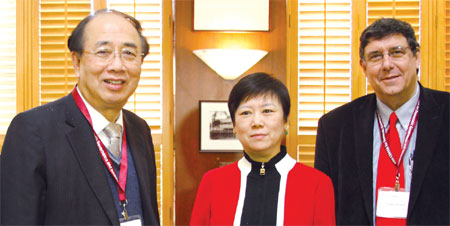Building a major country relationship discussed
Updated: 2014-03-26 12:03
By Hu Haidan in Boston (China Daily USA)
|
||||||||
Even if two countries do not share the same ideology, form of government and cultural background, they can still discover mutual benefits and interests.
So said Li Xiaolin, president of the Chinese People Association for Friendship with Foreign Countries (CPAFFC), which just wrapped up a high-level conference at Harvard's Kennedy School of Government on Tuesday. The subject of the conference was how to build a new type of major country relationship between China and the US.
Among the dignitaries present were Zhao Qizheng, dean of the school of journalism and communication at Renmin University; Li Xiaolin, president of the CPAFFC; Zhang Xinsheng, chairman of China Association for International Exchange; Sun Guoxiang, Chinese consul general in New York; Harvard professor Joseph Nye (who coined the term "soft power"); Larry Summers, former US Treasury Secretary; Drew Faust, president of Harvard University; and Kevin Rudd, former Australian prime minister.
At the press conference after the closed-door discussion, Zhao, Li and Tony Saich, director of the Ash Institute for Democratic Governance and Innovation, appeared.
Li said that 2014 marked the 35th anniversary of the establishment of China-US diplomatic relations and the conference mainly discussed how to build a new type of major country relationship between the two countries.
"In the one-and-a-half-day conference, we discussed how to protect our counterpart's major benefits and interests in the economy, energy, environment, education, urbanization and other areas," said Li.
"US President Nixon visited China in 1972," she said. "The reason for his 'ice-breaking' visit was not because he agreed with China's ideology, but to see how both countries could benefit."
Li added that building a new type of major country relationship does not mean agreeing with each other's ideologies or politics.
"It's about seeking common ground while preserving our differences," she said.
Zhao said people-to-people diplomacy has been given a new understanding and is taking on more and more responsibilities in today's society.
"The people-to-people diplomacy we talked about today is called 'two-track' diplomacy. It's the highest expression of public-diplomacy," he said.
He explained 'two-track' diplomacy normally includes retired government employees, scholars and those who may become government employees in the near future.
Saich said that throughout the discussion, many topics were met with both agreement and disagreement.
"It was a successful conference, as everybody spoke up," Saich said. "We would like to schedule deeper conversations regarding the environment, energy and certain other topics with China in the future," Saich said.
haidahu12@chinadailyusa.com
|
From left: Zhao Qizheng, dean of journalism at Renmin University of China; Li Xiaolin, president of CPAFFC and Tony Saich, director of the Ash Institute for Democratic Governance and Innovation, pose for a photo on Tuesday after a conference co-hosted by Harvard University and CPAFFC. Hu Haidan / China Daily |
(China Daily USA 03/26/2014 page1)
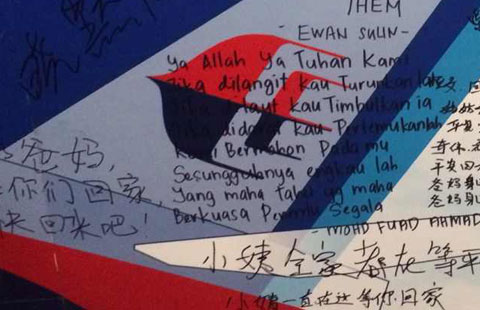
 Messages to passengers on board MH370
Messages to passengers on board MH370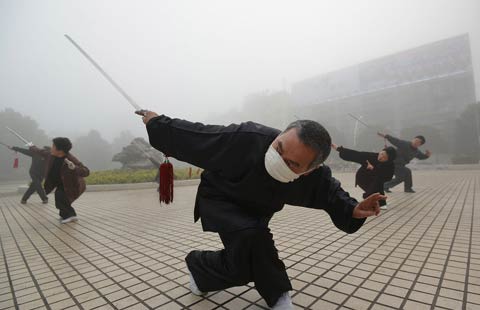
 Smog continues in North China
Smog continues in North China
 Probable death toll rises to 24 in Washington mudslide
Probable death toll rises to 24 in Washington mudslide
 Childhood on the landfill
Childhood on the landfill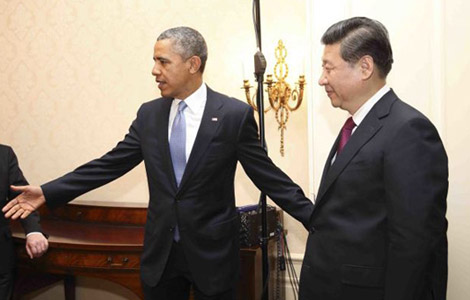
 Xi and Obama talk about family and jokes
Xi and Obama talk about family and jokes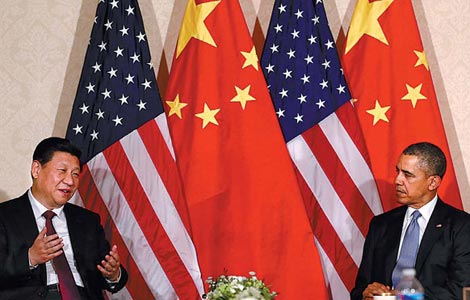
 Xi says China strengthens its nuclear security system
Xi says China strengthens its nuclear security system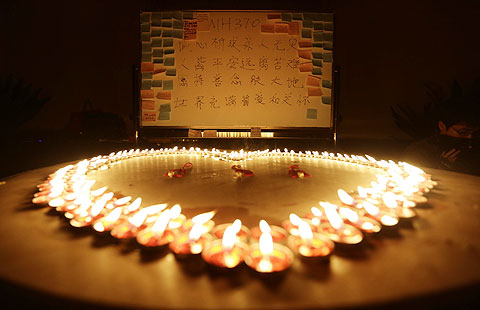
 17 days of prayers and hope
17 days of prayers and hope
 Prosperity poised to blossom
Prosperity poised to blossom
Most Viewed
Editor's Picks

|

|

|

|

|

|
Today's Top News
New centers to boost US-China ties
China-US 'sister' ties in full bloom
AALDEF to honor Chinese-American lawyer
Charles Yang integrates the violin into modern music
US first lady says embrace similarities
Angry relatives of lost 370 victims demand answers
Xi says China strengthens its nuclear security system
Judge makes history in Maryland
US Weekly

|

|
